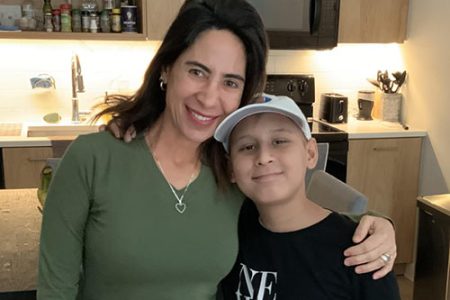Zander and his family have been coming to NIH from their home in Cancun, Mexico for the past 12 years to participate in a research protocol. Before his second birthday, Zander was diagnosed with a rare disease called Chronic Granulomatous Disease (CGD) which seriously impaired his immune system. People with CGD are highly susceptible to frequent and sometimes life-threatening bacterial and fungal infections.
In 2023, Zander came down with a serious and lingering case of pneumonia. His NIH team recommended Zander have a bone marrow transplant—a procedure that would mean not just a treatment but a cure for CGD.
In September, Zander’s mom Adriana got the good news: a donor has been found and Zander should come to Bethesda for the transplant. Patient and family would be required to stay in Bethesda for six month.
Housing and incidentals support from Friends filled the gap between what Zander’s research protocol would cover and what the family would need to fulfill the transplant requirements.
His mom Adriana explains, “The only way we could manage the transplant was to find a place to live close to NIH. . .treatment at NIH was the best thing to happen in our lives. I know we are in the best hands. . .Friends of patients was another great thing that happened for us. To stay for 100 days post transplant would have been very difficult for my family without support from Friends.”
In a few months, Zander will be able to travel home to join his father and sister. NIH will continue to monitor his health, but his prognosis is promising. Soon Zander will be able to do all the things his disease has prevented him from doing and the kind of things most of us take for granted. Zander has never been able to go barefoot in grass or enter damp places such as caves which Mexico is famous for. His mom says Zander is looking very much forward to his new adventures.





